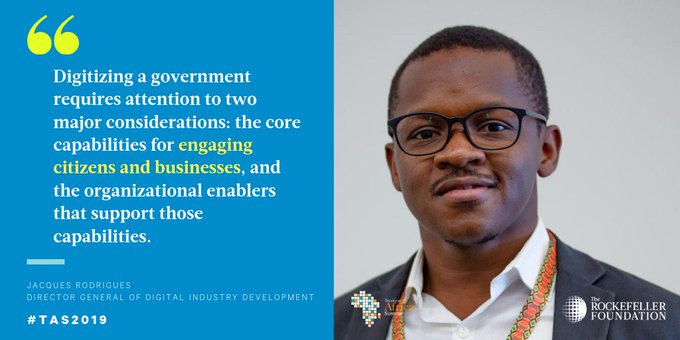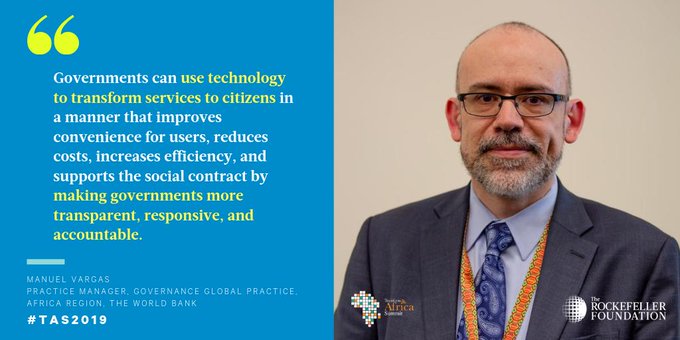THE ROCKEFELLER FOUNDATION: Putting People at the Center of Digital Transformation - Reflections on the Transform Africa Summit 2019
Putting People at the Center of Digital Transformation: Reflections on the Transform Africa Summit 2019

In May, Africa’s top digital leaders and donors converged in Kigali to attend the 2019 Transform Africa Summit—one of the continent’s premier convenings to discuss accelerating digital transformation in the region. The Rockefeller Foundation’s Data and Tech team sponsored two sessions on the topics of Data Governance and Privacy hosted, by our grantees at Future State, and a working lunch with Ministers of Information Communication Technology (ICT) of several countries, technology providers, and international organizations. We had the opportunity to learn about their priorities, the challenges they face in advancing digital economies and governments, and potential opportunities to expand digitization on the continent. Below is a summary of what we heard:
Digital transformation is less about deploying specific types of technologies and more about improving the government’s ability to deliver services and spur economic activity.
Too often, digital transformation discourse is focused on ‘shiny’ new things—deploying trendy technologies or using the latest tech buzzwords. Despite the numerous exhibits (and hype) from technology vendors at the Summit, country leaders focused their conversation primarily on how to deliver benefits to people over the qualities of the technology itself. Leaders were focused on how technology could optimize the business of government to solve ‘real problems,’ such as finding better ways to deliver birth certificates to every citizen or improving health services writ large. Such efforts depend largely on government’s ability to (re)organize itself, capture and manage citizen data appropriately, and deploy the right systems and tools to improve its functions. With the clear sense that technology is only a means to an end and not the end in itself, opportunities to partner with government to reconfigure its service delivery apparatus for the 21st century will be equally as important as helping it procure the right digital tools.
Yesterday, we hosted a roundtable in Kigali at #TAS2019 to consider how digital technologies offer the potential for African governments to be more effective in delivering services and growing their economies. @rodriguetwit offered this discussion point:
15 people are talking about this
Policymaking around data governance remains an area of peak interest to government leaders and a potential enabler for digital innovation.
Data governance policy at regional and continental levels was a key topic of conversation, especially as it pertained to national sovereignty and protecting citizen’s data. There was considerable appetite but also some anxiety around addressing how African officials can protect citizens’ data, especially when those data are often hosted elsewhere. Fears driven by cases of data misuse worldwide have led many governments to consider data localization as a potential solution, which may come at the expense of innovation. Our grantee, Future State, contributed to the debate in its session on data governance and explored ways governments can keep their citizen data safe while allowing it to be shared in order to derive more benefits for citizens. Some of their takeaways were discussed in this CNBC Africa interview that was held at the Summit. Overall, there was a consensus that policy frameworks need to be developed and tailored for the African context and not just replicated from elsewhere.
Capital mobilization in the space is expected to grow in the coming years, driven both by national success stories and donor interest.
A number of governments are already fairly advanced on their digital transformation journeys. For example, President Uhuru Kenyatta launched his country’s Digital Economy Blueprint—a roadmap for the Kenyan government to enhance the contribution of ICTs to the economy through digital governance solutions, digitizing business processes, and investing in digital talent—and called on other African governments and various regional organizations to do the same. There were also a number of development donor initiatives that will be aimed at accelerating digital transformation on the continent. For example, we learned about the World Bank’s GovTech Global Initiative that will promote the use of technology to transform the public sector, improve service delivery to citizens and businesses, and increase efficiency, transparency and accountability. Several other adjacent initiatives were mentioned which bodes well for countries and indicates rising momentum from key stakeholders to support governments along their digital transformation journeys.
Participants shared strategies to support government digitization in Africa at our #TAS2019 roundtable in Kigali last week. Manuel Vargas, @WorldBankAfrica, elaborated on #GovTech:worldbank.org/en/topic/gover…
See The Rockefeller Foundation's other Tweets
There were several other themes discussed at the Summit, from increasing investments in hard infrastructure (e.g. broadband internet and mobile technology), investing in the next generation of data science/AI talent to tackle African social challenges, to more tactical approaches to accelerating transformation such as connecting digital service teams across governments to address common problems. Overall, there was considerable interest among leaders spanning countries to put people first and center at the heart of their digital transformations, which is core to The Rockefeller Foundation’ vision of applying data-science techniques to solving our biggest challenges and improving lives at scale.





Comments
Post a Comment